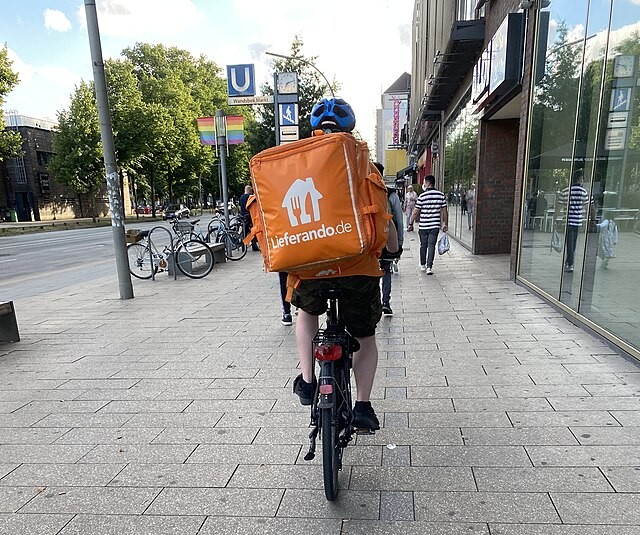In August of 2020 after Covid hit, most employees in Germany who could were working from home. That past spring, many employers had reluctantly sent workers to their houses and apartments, fearing a Covid outbreak at the workplace. Even though the spread of disease and the restrictions were relaxing, it was rare to find an occupied office building during those months, except for at the mobile bank N26, where life had continued in the office for the customer service employees, as if Covid didn’t even exist.
Normally under these kinds of conditions, employees in Germany would be able to contact their workers council (Betriebsrat) – a group of employees elected to negotiate with management. Some of these workers councils are associated with unions like ver.di, and others are set up within companies themselves. However, at N26, no such thing existed. And furthermore, employees were scared of speaking out for fear of losing their jobs in the middle of a pandemic. Nevertheless, a group got together and decided that enough was enough. The workers wanted representation, and supported by the weight of German labor law, they were going to go for it.
Only three people are needed to start a workers council, and although extremely common in Germany, no tech company in the country had one. Naturally, the N26 management wasn’t happy about the idea, and launched an all-out war to stop the employees from forming one. The Left Berlin spoke to an employee of N26 (name has been changed), who was there from the start.
The Left Berlin: So for someone who has no idea what’s going on, what happened?
N26: When Covid kicked off and every office was getting sent home, the N26 management refused to send customer service home. We basically did a bit of direct action, we sent around a survey that said, ‘Do you feel safe in the office?’ and of course the answer was no. I was the only one of my friends who was in any sort of office, all of my other friends were working from home at that point.
TLB: How did talk of a workers council start? What happened from there?
N26: I’d heard when I’d started that there were always rumors of a workers council but the way it worked at N26 at the time, you made it past a year, and then two years is obviously when you become permanent. Most people got fired before two years because they didn’t want a lot of permanent contracts. They had this ethos that they were a startup even though we were a fully fledged bank. And they were like ‘We’re a startup we’re go getters,’ and it’s like no, you’re a bank now, you have to get out of this startup mindset. We’re not just like in a WeWork and messing around with nerf guns, this is a fucking bank now. So Covid hit and customer service demanded that we get sent home, but they would only send people who’d been working there over 6 months home. And then the talk of the workers council fully kicked off and thankfully there was a lot of desire for it.
But the problem was, we lived in a constant state of fear of losing our jobs because they could say, ’Oh you want a workers council? Well, you’re not worked here more than a year so good luck you’re gone.’ Lots of people didn’t run for it, lots of people were even scared to comment on slack in support of a workers council, because really everybody was in a constant state of fear of losing their jobs, especially during Covid. Nobody wanted to rock the boat anymore than it was.
TLB: So did you get help?
N26: When you want to run an electoral board, a union can step in and help you, and advise you. The company has to pay for all of this, and union reps have a right that, if there’s one union member at a company, a union rep can come and just enter and just chat with you. You know, German labor laws, there’s no preventing unions from doing what they want to do.
There are two branches at N26, there’s N26 operations Gmbh: legal, and then N26 operations: anti-financial crime, customer service, complaints, all that kind of stuff. So we needed to form 2 separate workers councils for each of those entities. 3 people from each who wanted to be on the electoral board put themselves forward. The electoral board arranges the actual elections for the people who want to run the workers council. It’s so much bureaucracy, it’s so German.
The 3 people at each entity, I honestly don’t know how they did it but they were just so sick of how they were being treated, that they just didn’t give a fuck about possibly losing their jobs. They were like, we’re doing this and it’s happening. So, the ball starts rolling and the management lose their fucking shit and slack just becomes a war zone. And I specifically remember there was a guy who was legal council or something – he came onto slack and wrote this, not joking, essay, saying that unions are now going to start meddling in the company and slowing down the growth, they’re only for miners and factory workers and it’s an archaic structure and we don’t need them and they’re corrupt.
TLB: And there was no union representation at N26 before this at all?
N26: There were union members but even a talk of a union would be dangerous. You know the way startups are…the whole thing was ‘It will slow down our growth’, but really they wanted to chuck people really quickly, they wanted to be able to say:
‘Oh you don’t need labor rights, we have pizza parties.’
The classic.
TLB: Was that pretty much how all of management reacted?
N26: The people who were masters in law and working as lawyers or people who were engineers were saying well, we can pick and choose our jobs, we can do whatever we want, we don’t need a workers council, completely missing the point that like, most of the people in customer service or the lower rungs of operations can’t really pick and choose jobs, that it didn’t really work like that. And what a lot of them didn’t seem to grasp was like, it’s happening, there’s no stopping it. And that’s what shows how nobody really knew what the fuck a workers council was about, because they thought they could stop it by using a lot of people to say, ‘Let’s have a meeting about this, we’ll figure this out,’ and it’s like no, it’s happening. We’re going to set up the electoral board, the electoral board wants to hold meetings in a beer hall.
TLB: How did the meeting go?
N26: Ver.di ran that. And the reason they ran that was because three staff from N26 operations Gmbh who were due to run the meeting had a restraining order put on them by the management. This emergency restraining order – I’m pretty sure it’s for like abuse victims, cause you can go to court and get this restraining order and it’s immediately implemented and then it goes to court later. So it’s for people who are in abusive relationships, to get out, so it’s really fucked up that a company was using that.
TLB: The three people couldn’t come near other employees?
N26: Ya, they literally couldn’t hold the meeting, it was fucking crazy.
TLB: The unions stepped in then?
N26: So three staff receive emergency restraining orders, preventing them from holding the meeting. So the meetings are cancelled. And that was on the 12th of August, 2020. And then late, late at night when nobody was in, it ticked around until 11 pm on the 12th, midnight on the 13th, Ver.di step in and are like ‘We’re going to hold a meeting. We’ll tell you what to do because you have no idea. You can’t do this yourself.’ We went to Oliver Hauser, who represents all of the tech people for ver.di, I don’t think he sleeps, and he sat there explaining everything. There were some press outside but not much.
TLB: But the media picked it up eventually, right?
N26: All of this was being leaked by somebody to the media, what the founders were doing, and it caused a fucking shit storm, because labor rights in Germany? People aren’t going to be happy. And tech magazines were writing about it because they were like holy shit there’re a tech company and there’s about to be a fucking workers council (it was the first time in Germany), no one’s seen this before. That’s why it was such a massive deal. Then there’s this twitter account, N26 workers, getting information and putting it out on Twitter. In customer service we were getting calls, emails chats, people saying like ‘Fuck the bosses, up the workers, don’t let them do this to you, you’ll get your representation.’
TLB: And the second workers council meeting?
N26: That was on the 13th, on the 14th. That was when N26 Gmbh, the legal side of things was meant to be their meeting. However another emergency restraining order was taken out, this time against ver.di and the founders were posting on slack saying, ‘A union has tried to interfere with the workers council election, we obviously want this to happen but they are going to interfere, and they’re not going to represent you correctly.’ But if they wanted it to happen why did they get an emergency restraining order against the staff who were just trying to let it happen? They couldn’t have made it any worse, I don’t know what they were thinking.
They got an emergency restraining order against ver.di then, on the 14th, but then IG Metall, who represent Volkswagen, they were the union who just got the 4 day work week for Volkswagen last year – a very good union – they stepped in to run the meeting, and that went into the press. And this was like celebrity drama. Everybody was writing about it, it was snowballing. If the management had just let it happen, you probably wouldn’t have heard about it. It would have just happened, and it would have been like ‘Wow, a tech company set up a workers council, isn’t that crazy?,’ but they made it so much worse. They couldn’t have done it any worse. Unless they literally brought in strike breakers to beat us up, they couldn’t have made it any worse.
And I remember, this is what was so crazy about the second day, when N26 Gmbh had their meeting, that’s where IG Metal ran it – someone called the cops, saying that it wasn’t compliant with Covid regulations. Ya, someone, called the cops. And people were suggesting on slack, ‘Oh maybe the cops just came to do a random spot check!’ Like that happens, like cops were just going around doing random spot checks. It was fucking insane. The cops come in, take a look at the place, see that it’s perfect and then leave immediately. And then I remember somebody commented on slack saying, ‘I sit here in the office beside my colleague with no mask on, closer than we were sitting in the beer hall. So if it was dangerous to be there, why are we even in the office?’
What was so funny about that meeting, Oliver Hauser said ‘Hey listen, the management are going to try to offer you alternative representation. Don’t fall for it. This is what happens. It happens any time someone wants to form a workers council.’ And literally within a day, the management are offering the Global Employee Representation Board and saying a workers council will only represent our entity in Germany. It won’t represent our entity in Austria, or Barcelona, or New York.
It’s like, yes, because it’s a German thing. It’s not legal to represent the Austrian office, it’s not legal to represent the Barcelona office. If they have an equivalent, set it up, full support, but it doesn’t make a difference. But the Global Employee Representation Board, what’s the difference? No protection under German law. A union can’t help them, it’s not protected in any sort of way. So the elections got run for that in December 2020, I have no idea who was on it, I genuinely haven’t a clue, and it got disbanded last month.
In the end, the workers were successful and N26 now has functional workers councils that can advocate for employee rights. And other tech companies in Berlin and around Germany are starting workers councils as well, including at Hello Fresh, Flink, and at Amazon. If you’re interested in learning more, or getting involved in organizing your own workplace, the Berlin Tech Workers Coalition is a great place to start.
Find out more about the Berlin Tech Workers Coalition.




